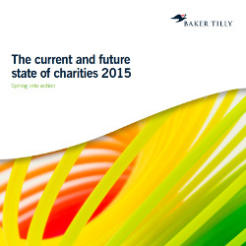Two-thirds of charities, surveyed by accountancy firm Baker Tilly, have said that they fear reductions in government funding in the 12 months following the election.
Of the 120 charities that took part in Baker Tilly’s survey, The current and future state of charities 2015: Spring into action, 67 per cent said that sourcing new revenue streams was their biggest funding challenge, while 24 per cent of respondents said they had found that government funding had significantly decreased in the last year.
The report said that “replacing the money from government sources that have been cut dramatically during the austerity programme, will continue to have an effect for some time, unless a change in policy occurs as a result of the 2015 General Election”.
Baker Tilly also asked charities what the biggest changes they have experienced in the way that funding is obtained in the past 12 months are. 59 per cent of charities noted increased competition for funds, while 29 per cent said they noted a change in the requirement for them to demonstrate social action in order to get funding. Another 21 per cent said they had noticed a longer period of time from application to obtaining funds.
Karen Spears, head of charities and not for profit within Baker Tilly’s restructuring and recovery practice, said: “Overall, our survey suggests that charities have coped relatively well over the last few years despite government cutbacks and funding remains broadly stable. However, the reported increase in competition for funding and the recognition that sourcing new funding streams is getting even harder should perhaps set alarm bells ringing for some.”
The study revealed that government funding has significantly decreased for 24 per cent of respondents, while half the charities surveyed said they expect an increase in individual donations in the next 12 months.
Nick Sladden, head of charities at Baker Tilly, said: “As competition for funding hots up, charities will need to combine innovation and investment in fundraising with robust financial controls and sound governance. Potential funders will also be looking for hard evidence of effectiveness and impact, and those that can’t deliver might find themselves at a disadvantage.”
Some 45 per cent of charities surveyed said that one of their biggest funding challenges is recovery of the full costs of service provision, although this has dropped from 55 per cent in 2013.
The report said: “It is vital that charities reflect a fair picture of their true costs, especially as the knock on effect could be felt in the sustainability of not only themselves but other charities.”
Reserves policies
The report found that nearly half of charities surveyed are using reserves to manage costs and cash flow, with almost half anticipating that their reserves “will lower over the next 12 months”.
Of those asked, 35 per cent said that they anticipate their organisation’s reserves slightly increasing in the next 12 months, with 16 per cent saying that they expect to see no change and 35 per cent expecting to see their reserves slightly decreasing.
The report said: “Using reserves in this way is not necessarily a problem in itself, but having a clear awareness of levels and the long-term viability of such an approach needs to be considered. It should be seen as a short-term fix rather than a financial strategy”.
It referenced a “high profile charity which folded recently” who “admitted that it experienced problems by not following its reserves policy”, likely to be a reference to BeatBullying which was forced to go into administration at the end of 2014.








